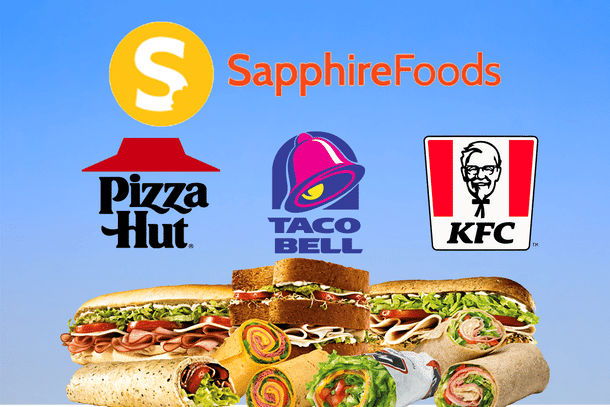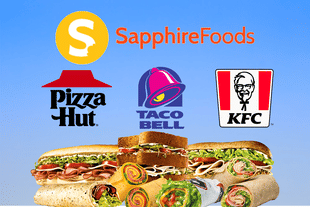Business
Sapphire Foods IPO: Should You Buy In?
Sourav Datta
Nov 09, 2021, 03:07 PM | Updated 03:07 PM IST
Save & read from anywhere!
Bookmark stories for easy access on any device or the Swarajya app.


Sapphire Foods’ Initial Public Offering (IPO) opens today. The IPO will be an offer for sale where the existing shareholders will offload shares worth Rs 2,000 crore, and no fresh equity shares will be issued.
Existing shareholders are looking to exit the business as the market environment is conducive. The price band has been set at around Rs 1,120 to Rs. 1,180 per share.
Sapphire is Yum Foods’ largest franchisee operator in the Indian subcontinent, and Sri Lanka’s largest quick service restaurant (QSR) chain both by revenue and number of stores.
Yum Foods owns popular restaurant brands like KFC, Pizza Hut, and Taco Bell. Sapphire operates these franchisee restaurants under a non-exclusive agreement. Sapphire operates KFC outlets across Maldives and India, the Pizza Hut brand across India, Maldives and Sri Lanka, and the Taco Bell brand in Sri Lanka.
The India business contributes to 80 per cent of the company’s revenues, while the remaining businesses contribute to 20 per cent of the company’s revenues.
The company expects the growing income levels in India, along with a growing urbanisation, and an aware young audience to drive demand in the future.
Sapphire operates 450 restaurants as of June 2021.
Sapphire has been a loss-making entity since the pandemic began. Consequently, the company has been implementing different strategies in order to become profitable.
The company has an omni-channel strategy wherein it offers takeaway, own and aggregator delivery, and dine-in services. The delivery business has rapidly scaled from 21 per cent of the company’s revenues in 2019, to 41 per cent in 2021.
In addition, the company has been scaling down the average size of its stores by around 40 per cent in order to optimise the restaurants costs while not impacting the revenues.
The cost control measures have resulted in lower capital expenditure outgo according to the company prospectus. Currently, a new KFC restaurant costs Rs 1.7 crore in 2021 against Rs. 2.1 crore in 2019.
Sapphire must complete a pre-decided number of store openings. In addition, the company is introducing value products to increase customer consumption and get new customers.
The company is also working on renegotiating contracts. The company same-store sales growth rate (SSSGR) has been lower than those of listed peers such as Jubiliant Foodworks (which runs Domino’s Pizza), Westlife (which runs McDonald’s), and Burger King in 2019.
Due to the pandemic, the SSSGR has fallen by 30 to 35 per cent in fiscal 2021 for Sapphire’s India business. The company has reduced its borrowing from around Rs 80 crore to Rs 51 crore over the last two years, and a debt-to-equity ratio lower than one.
The company’s revenues have fallen from Rs 1,206 crore in fiscal 2019 to Rs 1,081 crore in fiscal 2021, due to the pandemic and accompanying lockdowns.
The company’s Earnings before Interest, Depreciation, Taxes, and Amortization (EBIDATA) margins stand at around 13 -14 per cent for the KFC business, whereas the margins for the Pizza Hut business stand at 5-7 per cent.
In contrast, the Sri Lanka business has generated EBIDTA margins of around 16-19 per cent. Overall the margins stand at around 12 per cent over the last three fiscals, with the peak at 13.8 per cent.
Therefore, the Pizza hut business has been a relative drag on the margins, while the Sri Lanka business has propped up the margins.
Sapphire’s competitor Devyani has posted much higher margins of around 16 to 21 per cent in the last three fiscals. In addition, the Sri Lanka business showed a SSSGR of 1 per cent in contrast to the fall in the India business.
Further, the company is yet to turn a profit. Nevertheless, the company has generated positive cash flows from operations over the last two fiscals, due to prudent working capital management and high depreciation expenditures.
The company had been valued at seven times its sales, whereas peers like Jubiliant, Westlife and Burger King and Devyani trade at anywhere between 10 to 15 times of the sales figure.
Key Risks
Covid Disruptions
Pandemic-related supply chain disruptions, combined with lockdown or consumer reluctance to dine or order from outside could affect the company’s financials adversely.
In addition, if the company is unable to renegotiate leases and other liabilities, it could be affected adversely. Food safety related concerns could affect the company adversely as well.
Franchise Agreement Rules
The company is required to adhere to rules established by Yum Foods in terms of quality standards, store additions, store design and other aspects. Non-adherence to such rules could result in a cancellation of the agreement.
Sapphire relies on Yum’s technical know-how, processes, brand value and established systems to run its business.
Statutory Auditor’s Emphasis on Matters
The statutory auditor for Sapphire has highlighted serious delays in payments of taxes, employee provident funds, labour welfare fund, employees state insurance, professional taxes, and several other payments for fiscals 2019, 2020, and 2021.
Brand Image
The company is highly dependent on a strong brand image for its revenues, but the image could be a double edged sword. In 2018, an employee posted pictures of inferior quality chicken and alleged that KFC had produced the food item.
In the era of social media, such posts could harm the company’s reputation.
Competition
Increased competition could affect the company’s margin adversely as some of its brands like Pizza Hut compete with larger and more popular players like Dominos and other companies crowding the space.





